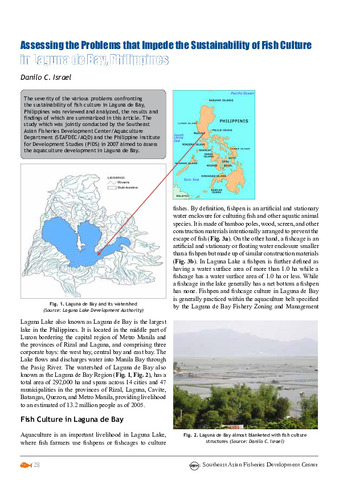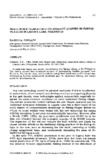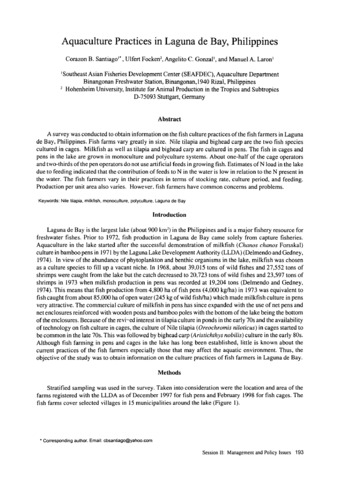ສະແດງບັນທຶກທີ່ງ່າຍດາຍສໍາລັບລາຍການ
Achieving sustainable aquaculture in Southeast Asia: A case study on community-based giant freshwater prawn production in Laguna Lake, Philippines
Share
| dc.contributor.author | Salayo, Nerissa D. | |
| dc.contributor.author | Aya, Frolan A. | |
| dc.contributor.author | Montinola, Quenie S. | |
| dc.contributor.author | Ito, Sayaka | |
| dc.contributor.author | de la Peńa, Leobert D. | |
| dc.contributor.author | Bautista, Richelle T. | |
| dc.coverage.spatial | Bay, Laguna de | en |
| dc.coverage.spatial | Laguna | en |
| dc.coverage.spatial | Philippines | en |
| dc.date.accessioned | 2024-10-21T02:44:03Z | |
| dc.date.available | 2024-10-21T02:44:03Z | |
| dc.date.issued | 2024-10 | |
| dc.identifier.citation | Salayo, N. D., Aya, F. A., Montinola, Q. S., Ito, S., de la Peńa, L. D., & Bautista, R. T. (2024). Achieving sustainable aquaculture in Southeast Asia: A case study on community-based giant freshwater prawn production in Laguna Lake, Philippines. Fish for the People, 22(2), 24-29. | en |
| dc.identifier.uri | http://hdl.handle.net/20.500.12066/7521 | |
| dc.description.abstract | The Aquaculture Department of the Southeast Asian Fisheries Development Center (SEAFDEC/AQD) implemented the project “Sustainable Aquaculture through Cost-effective Culture Systems, and Prompt and Effective Aquatic Animal Health Management” from 2020 to 2024 with support from the Japanese Trust Fund (JTF). The Project consists of three main activities: 1) cost-effective culture system, 2) prompt and effective aquatic animal health management, and 3) capacity enhancement for sustainable aquaculture. It complies with Resolution No. 16 Strengthen aquaculture governance and implement good aquaculture practices to sustain production for food safety and security, sustainable livelihoods, and rural development of the ASEAN-SEAFDEC Resolution and Plan of Action on Sustainable Fisheries for Food Security for the ASEAN Region Towards 2030 (RES&POA-2030). Recognizing the success and expertise of AQD in the development of aquaculture technologies, especially in broodstock management, spawning, larval rearing, nursery and grow-out culture of aquatic fish, crustaceans, mollusks, sandfish, and seaweeds, feed development, fish health management, development of vaccine treatment, protective measures against existing and emerging diseases, community-based resource management, and implementation of aquaculture related training courses, the Project was conducted to improve the stability and sustainability of aquatic food production and for technology dissemination in the Southeast Asian region. Under Activity 1 of this Project, this study aims to establish a community-based seedlings supply system. This article highlights the inherent challenges of hatchery production, particularly our growing vulnerability to climate variability, including temperature fluctuations and water quality issues. Effective data monitoring can guide adaptive management strategies through science-based strategies, such as investing in appropriate technologies, adjusting densities, and changing feeding practices to boost production yields. | en |
| dc.language.iso | en | en |
| dc.publisher | Secretariat, Southeast Asian Fisheries Development Center | en |
| dc.title | Achieving sustainable aquaculture in Southeast Asia: A case study on community-based giant freshwater prawn production in Laguna Lake, Philippines | en |
| dc.type | magazineArticle | en |
| dc.citation.volume | 22 | en |
| dc.citation.issue | 2 | en |
| dc.citation.spage | 24 | en |
| dc.citation.epage | 29 | en |
| dc.citation.journalTitle | Fish for the People | en |
| dc.subject.asfa | aquaculture | en |
| dc.subject.asfa | sustainable aquaculture | en |
| dc.subject.asfa | shrimp fisheries | en |
| dc.subject.asfa | prawn culture | en |
| dc.subject.asfa | livelihoods | en |
| dc.subject.scientificName | Macrobrachium rosenbergii | |
| local.subject | community-based | en |
| local.subject | sustainable livelihood | en |
| local.subject | GFP aquaculture | en |
| local.subject | giant freshwater prawn | en |
| local.subject | Macrobrachium rosenbergii | en |




